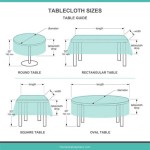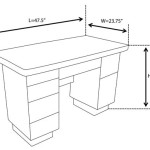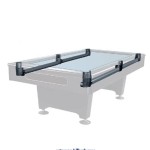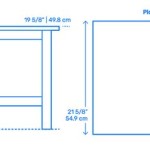How Much Does A 7ft Slate Pool Table Weigh?
Understanding the weight of a 7ft slate pool table is crucial for several reasons. Whether you are planning a move, renovating a room, or simply curious about the engineering behind this popular game table, knowing its weight helps in proper planning and execution. The weight of a pool table is primarily determined by the slate bed, which is the foundational component responsible for providing a level and consistent playing surface. This article will delve into the factors contributing to the overall weight of a 7ft slate pool table, the different types of slate used, and how to estimate the weight accurately.
Pool tables, especially those with slate beds, are significantly heavier than they appear. This weight is essential for stability and prevents the table from shifting during gameplay. A lighter table would be prone to movement, affecting the accuracy of shots and the overall playing experience. The slate bed's density and thickness are the primary determinants of the table's weight, but other components such as the frame, legs, and rails also contribute.
A standard 7ft pool table is often referred to as a bar-size table, commonly found in commercial establishments and homes. Its dimensions typically measure around 84 inches in length and 42 inches in width. While these dimensions are relatively standard, the weight can vary considerably based on the factors mentioned above. Ignoring these considerations can lead to logistical challenges during transportation and installation.
Factors Influencing the Weight of a 7ft Slate Pool Table
Several key factors contribute to the total weight of a 7ft slate pool table. Understanding these factors will provide a clearer picture of the weight ranges to expect.
Slate Thickness: The thickness of the slate is the most significant factor affecting the weight. Slate is typically available in thicknesses ranging from ¾ inch to 1 inch. Thicker slate provides a flatter and more stable playing surface but adds substantial weight. A 1-inch slate will invariably weigh more than a ¾-inch slate of the same dimensions. This increased thickness translates directly to an increased volume of the dense slate material, thereby increasing the overall weight.
Number of Slate Pieces: Pool tables traditionally utilize either a one-piece or a three-piece slate construction. One-piece slate tables are more common in older or less expensive models. While a single piece may seem simpler, it can present challenges during moving due to its awkward size and concentrated weight distribution. Three-piece slate tables are considered superior in terms of leveling and ease of installation. The weight is distributed across three separate pieces, making them easier to handle. However, the overall weight of the slate material remains a significant contributor.
Frame and Cabinet Construction: The materials used for the frame and cabinet also influence the overall weight. Solid wood frames are heavier than those constructed from cheaper materials like particle board or MDF (Medium-Density Fiberboard). While these lighter materials reduce the overall weight of the table, they may compromise its structural integrity and long-term durability. The choice of materials used in the frame and cabinet represents a trade-off between weight and stability.
Leg Design and Material: The design and material of the legs also contribute to the total weight. Solid wood legs are heavier and more stable than metal or plastic legs. Intricate leg designs with substantial wood volume will add more weight compared to simpler, streamlined designs. The legs are critical for supporting the entire weight of the table, so selecting durable and robust materials is crucial for longevity.
Rail and Cushion Materials: The rails and cushions surrounding the playing surface also add to the overall weight. High-quality rubber cushions and solid wood rails are heavier than cheaper alternatives. These components are essential for providing accurate ball rebound and contribute to the overall playing experience. The choice of materials used in the rails and cushions reflects the quality and craftsmanship of the pool table.
Weight Ranges for 7ft Slate Pool Tables
Given the various factors influencing weight, the typical weight range for a 7ft slate pool table is between 500 and 750 pounds. This range encompasses tables with different slate thicknesses, frame materials, and other construction variations. A table with ¾-inch slate, a solid wood frame, and robust legs will likely fall towards the higher end of this range. Conversely, a table with thinner slate and lighter frame materials will be closer to the lower end.
It is important to note that these are general weight ranges, and specific models may fall outside this range. The only way to determine the exact weight of a particular pool table is to consult the manufacturer's specifications or weigh the table directly. Attempting to move a pool table without knowing its approximate weight can lead to injuries and damage to the table and surrounding environment.
The weight of the slate itself can be estimated based on its dimensions and thickness. A single piece of ¾-inch slate for a 7ft table is likely to weigh between 250 and 350 pounds. If the table uses a three-piece slate design, each piece will weigh correspondingly less, but the total weight of the slate will remain within the same range. The weight of the slate significantly contributes to the overall stability and playing performance of the pool table.
The frame, legs, and other components can add another 200 to 400 pounds to the total weight. This weight distribution ensures that the table remains stable during gameplay and can withstand the forces exerted by players leaning on the rails and making shots. The combination of the slate weight and the weight of the other components results in a substantial and stable playing platform.
Practical Considerations for Moving and Installation
Knowing the weight of a 7ft slate pool table is essential when planning a move or installation. Improper handling can lead to serious injuries and damage to the table and the surrounding property. It is highly recommended to hire professional movers who specialize in pool table transportation and installation. These professionals have the necessary equipment and experience to safely disassemble, transport, and reassemble the pool table.
Before attempting to move a pool table, it is crucial to assess the path and ensure that it is clear of obstacles. Tight doorways, narrow hallways, and stairs can present significant challenges. Measuring the dimensions of the pool table and the available space is essential for planning the move. It may be necessary to partially disassemble the table to navigate challenging areas.
When disassembling a pool table, it is essential to remove the slate pieces carefully. These pieces are heavy and fragile, and dropping them can result in cracks or breakage. Using appropriate lifting equipment, such as dollies and straps, is crucial for safe handling. It is also important to protect the slate surfaces with padding or blankets to prevent scratches and dents during transportation.
During installation, ensuring that the pool table is perfectly level is critical for accurate gameplay. Professional installers use precise leveling tools to adjust the table's height and ensure that the playing surface is perfectly flat. An unlevel table will cause balls to roll unpredictably, affecting the accuracy of shots. Proper leveling is an essential aspect of pool table installation.
The cost of moving and installing a pool table can vary depending on the distance, complexity of the move, and the expertise of the movers. Obtaining quotes from several professional movers is recommended to ensure a competitive price. While it may be tempting to attempt the move yourself to save money, the risk of injury and damage to the table outweighs the potential cost savings. Investing in professional moving services is a worthwhile investment for the long-term care of your pool table.
In summary, the weight of a 7ft slate pool table is a significant factor to consider when planning a move or installation. Understanding the factors that contribute to the weight, such as slate thickness, frame construction, and leg design, is crucial for accurate estimation. Hiring professional movers is highly recommended to ensure the safe and proper handling of this heavy and delicate piece of equipment. Taking these considerations into account will ensure a smooth and successful pool table moving experience.

How Much Does A Slate Pool Table Weigh Find Out Now Clean Campaign

How Much Does A Slate Pool Table Weigh Find Out Now Clean Campaign

How Much Does A Pool Table Weigh Weight Charts

How Heavy Is A Pool Table

How Much Does A Slate Pool Table Weigh Full Breakdown By Size Sawyer Twain

How Much Does A Pool Table Weigh Weight Charts

Pool Table Weight How Much Does A Weigh Home Billiards S

Walker Simpson Vegas Deluxe 7ft Slate Pool Table With Dining Top

Walker Simpson Captain 7ft Slate Bed Pool Table

7ft Deluxe Quality Italian Slate Pool Table








